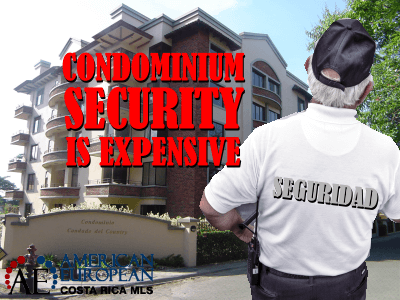 Not always can the condominium owners afford to contract a condo manager. Is self-management of a condominium in Costa Rica a good solution?
Not always can the condominium owners afford to contract a condo manager. Is self-management of a condominium in Costa Rica a good solution?
The financial cost of hiring a condominium manager is quite high. Particularly when the condominium is a small one, it might be very necessary for an HOA to cut costs everywhere possible. The cost of managing a condominium effectively financially is an important task for condo owners.
Older condominiums in Costa Rica, constituted many years ago, have this problem. Those condominiums were much smaller than they are now. Therefore, the cost of condominium security was a lot lower than it is now.
Years ago, it was customary for smaller condominiums in Costa Rica to have an undocumented Nicaraguan security guard. This security guard would often live on the premises without social security.
Labor law and immigration law
Since 2010, the new Immigration law #8764 prohibits a person or a corporation from hiring illegals. This law obliges condominium owners and condominium administrators to hire security personnel with a working permit. This in turn, obliges them to insure their personnel with the CCSS or Caja and with INS for workers’ comp.

The daily control and maintenance of the amenities can take up more time than is available for a volunteer condo manager.
This obligation more than doubles the cost of the security in the condominium, besides the fact that if you have an employee who lives on the property, the supply of the living quarters is seen as salary in species by law. In that case, it is the homeowner association that is responsible for the employees hired by the manager.
These facts oblige smaller homeowner associations to self-management of a condominium sometimes.
Condo manager tasks
There are 3 main tasks at hand when managing a condominium
1) HOA Financials – This includes managing the funds and keeping track of incoming and outgoing funds as well as reporting on the financial status of the association to the board.
2) Project Management – Every project, no matter its size, needs to be managed properly. This can be the hiring of a gardener or a security guard. This can also be constructing a new roof for the condominium or a deck around the pool. The status of each project needs to be reported monthly to the board of the HOA.
3) HOA Rules Enforcement – The bylaws of the condominium that are registered give the HOA the duty to enforce restrictions, rules, covenants, and regulations in the community. It is the job of the condominium manager to enforce those rules. Failure to properly enforce the rules can result in lawsuits, lower property values, and angry homeowners.
Professional condo manager
Having or not having a condominium manager is entirely a decision of the condominium owners. It is a decision that has to be taken during the condo owner meeting that is held once a year. The bylaws will state what percentage of condo owners will be needed to elect a condominium manager.
Hiring a condo manager is not a financial option for every condominium. A large condominium, with large common areas and amenities like a pool, tennis courts, and others, has more work for a manager than a small one without those amenities. And a large condominium has, of course, more financial resources than a small one.

The financial cost of security can be tremendous for a smaller condominium in Costa Rica.
Advantages and disadvantages
What are the advantages and disadvantages of the self-management of a condominium?
Advantages
- In a small condominium, there are not too many employees. For this reason, little time investment is necessary to control employees.
- There will be better control and correct billing over expenditures.
- The self-management of a condominium can be financially attractive. The financial cost of having a professional condo manager can be high and maybe not affordable for some homeowners.
- Changing a new manager is usually difficult when a new condo management company is hired.
- Self-management of a condominium will be a much easier transition with the change in management.
Disadvantages
- The workload can be overwhelming unless the homeowner who manages the HOA voluntarily has lots of spare time. A management company is on call 24/7.
- A homeowner–manager might lack experience in the self-management of a condominium.
- The administrator has to be personally available during any repairs, which takes up a lot of time.
- There is possibly a lack of knowledge of the condominium and labor laws unless the manager is a lawyer. The manager should know all about the rights and obligations of a condo owner to make decisions.
- Does the manager know all about the association’s tax obligations?
- The manager might have to play the bad guy. It is much more difficult to enforce the HOA rules because there is a personal relationship with the neighbors. A simple parking dispute or an eviction of a misbehaving tenant can become a major headache.
- There are too many amenities or employees for a volunteer manager to oversee.
- The HOA might have to invest in the purchase of hardware, software, etc., depending on the size of the HOA.
- Hiring and firing employees and any daily management decisions are more difficult to make.
- When the manager is sick, there is no replacement unless other neighbors agree to cooperate.

The eviction of a tenant or homeowner breaking the rules can become a serious headache.
Pay or not pay the manager?
In my personal opinion, the HOA should pay the manager for all the effort if the HOA elects for self-management of a condominium. An unpaid manager will quickly become frustrated and disillusioned, especially when the neighbors decide not to cooperate much.
It might be necessary to amend the bylaws of the condominium to make the payment of a stipend or salary to a homeowner who acts as a manager.
Are you planning to purchase a condominium in Costa Rica? Contact us now; we have all the necessary expertise to assist you in your purchase.



















1 Comment
This decision really depends on the condo owner. if you’re capable and willing to manage the unit yourself, you can save on management fees. Consider factors like your availability, expertise, and budget before making a decision. However, hiring a property manager can help you with tasks like maintenance, tenant communication, and financial management. It really depends on your needs and situation.